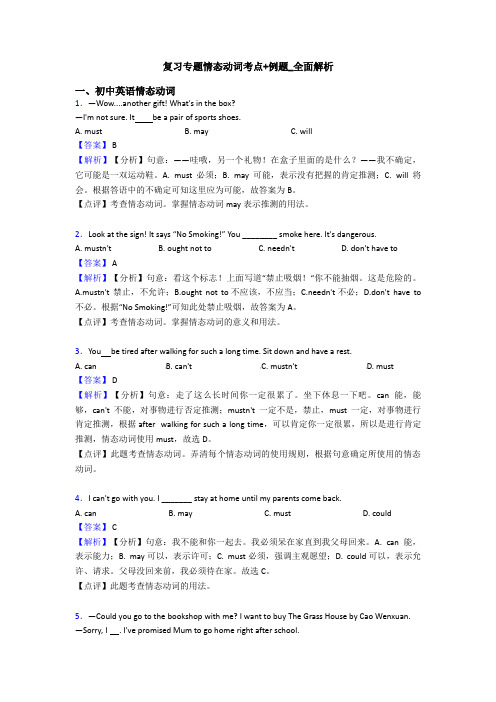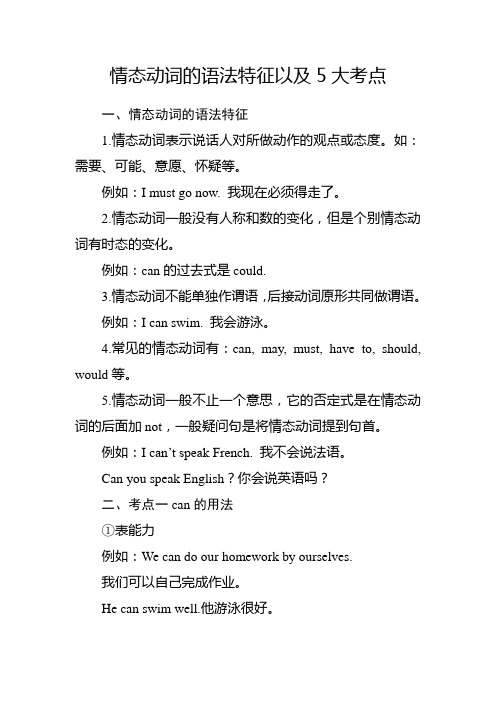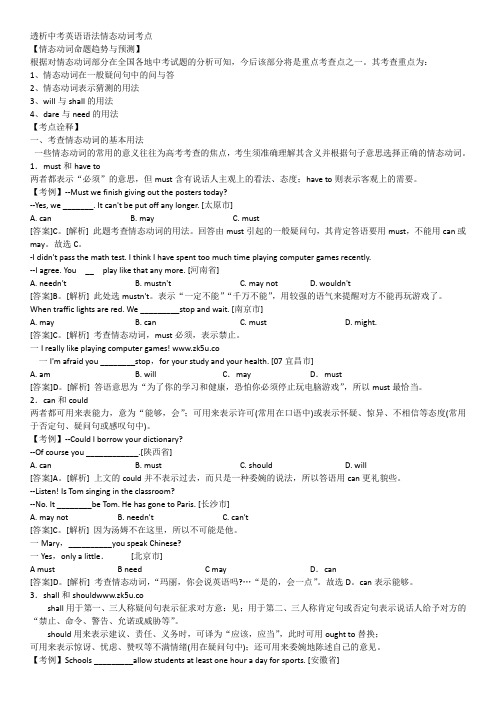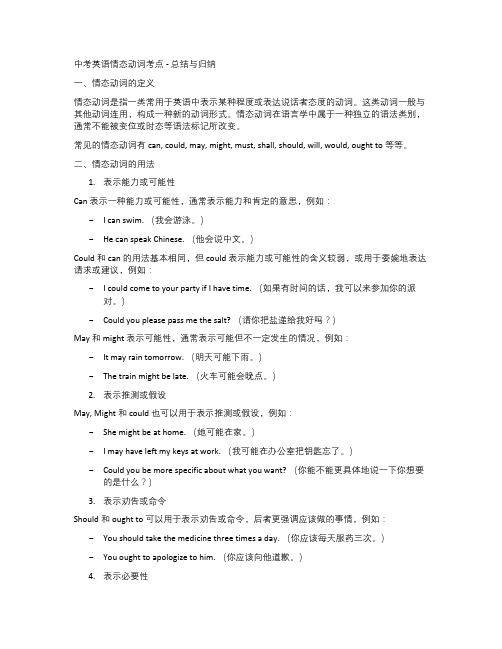情态动词考点例析
情态动词考点解析

项 形式
目
用法
情 态 动 词 + be + 对 现 在 的 情 况 或 状
1 adj. / n.
态 的推 测
情 态 动 词 + be 对 正在 进行 的动 作
2
Hale Waihona Puke doing进 行推 测
3 情 态 动 词+ have 对 过 去 发 生 的 事 实
done
或 状态 的推 测
4 情 态动 词+ v.
对 将来 发生 的事 实 或 状态 的推 测
例 1: He must be very angry with you. 他 一定 很生 你的 气。
Mary can’t be at work now. I saw her having a tennis match just now. 玛 莉 不 可 能 正 在 工 作 。 我刚 才 还 看 到 她 参 加 网 球 比 赛 呢。
will / would 表示 推 测多 用 二、 三 人称 , 其 中 would 比 will 的 可 能 性 小 ; should / ought to 表示 推 测多 用于 肯 定句 中 , 表 示 推 理 “应该 、会 ”。例 如:
情态动词详解+例句

情态动词详解 +例句一、单项选择情态动词1.No driving after drinking is a rule that every driverC .may 【答案】 B【解析】2.-- Did Jim come?A . wil lB . shall 试题分析:考察情态动词。
A.将要B 将要C 可能 D.可以。
Will 表示请求、建议、意志、愿望和决心。
Shall 用于第二、第三人称,表示说话人给对话的命令、 May 表示请求和允许;用于祈使句表示决心;表示推测、可能性。
允许。
句意:酒后驾车是每一位驾车者在我们国家应当遵守的规则。
考点:考察情态动词 警告、允诺或威胁。
Can 表示能力;请求和 故选 B 。
obey in our country.D . can-- I don ' t know. He A . might have come C . must have come while I was out.B .might come D . should have come解析】【详解】 考查情态动词推测用法。
句意: Jim 来了吗? --我不知道,在我不在的时候,可能来过。
根 据前文I don ' t kno 可知,说话者不知道 Jim 来没来,因此后文推测来过,但是语气很不确 定,故可知选 A 。
对过去情况的推测为情态动词+have done , must have done —定做了某事, should have done 应该来过,不符合,故选 【点睛】A 。
情态动词+have+过去分词的用法,表示推测或判断过去的情况。
can/could+have+ 过去分词用法: ① 多用于否定句和疑问句中。
表示对过去某事发生的可能 性的否定或质疑,意为:不可能(已经) ............................. 了-(否定句) /可能(已经) 了嘛?-(疑 问句) ② 用于肯定句中。
复习专题情态动词考点+例题_全面解析

复习专题情态动词考点+例题_全面解析一、初中英语情态动词1.—Wow....another gift! What's in the box?—I'm not sure. It be a pair of sports shoes.A. mustB. mayC. will【答案】 B【解析】【分析】句意:——哇哦,另一个礼物!在盒子里面的是什么?——我不确定,它可能是一双运动鞋。
A. must必须;B. may可能,表示没有把握的肯定推测;C. will将会。
根据答语中的不确定可知这里应为可能,故答案为B。
【点评】考查情态动词。
掌握情态动词may表示推测的用法。
2.Look at the sign! It says “No Smoking!” You ________ smoke here. It's dangerous.A. mustn'tB. ought not toC. needn'tD. don't have to【答案】 A【解析】【分析】句意:看这个标志!上面写道“禁止吸烟!“你不能抽烟。
这是危险的。
A.mustn't 禁止,不允许;B.ought not to不应该,不应当;C.needn't不必;D.don't have to 不必。
根据“No Smoking!”可知此处禁止吸烟,故答案为A。
【点评】考查情态动词。
掌握情态动词的意义和用法。
3.You be tired after walking for such a long time. Sit down and have a rest.A. canB. can'tC. mustn'tD. must【答案】 D【解析】【分析】句意:走了这么长时间你一定很累了。
坐下休息一下吧。
can能,能够,can't不能,对事物进行否定推测;mustn't一定不是,禁止,must一定,对事物进行肯定推测,根据after walking for such a long time,可以肯定你一定很累,所以是进行肯定推测,情态动词使用must,故选D。
情态动词的语法特征以及5大考点

情态动词的语法特征以及5大考点一、情态动词的语法特征1.情态动词表示说话人对所做动作的观点或态度。
如:需要、可能、意愿、怀疑等。
例如:I must go now. 我现在必须得走了。
2.情态动词一般没有人称和数的变化,但是个别情态动词有时态的变化。
例如:can的过去式是could.3.情态动词不能单独作谓语,后接动词原形共同做谓语。
例如:I can swim. 我会游泳。
4.常见的情态动词有:can, may, must, have to, should, would等。
5.情态动词一般不止一个意思,它的否定式是在情态动词的后面加not,一般疑问句是将情态动词提到句首。
例如:I can’t speak French. 我不会说法语。
Can you speak English?你会说英语吗?二、考点一can的用法①表能力例如:We can do our homework by ourselves.我们可以自己完成作业。
He can swim well.他游泳很好。
I can play football but I can’t play the piano.我会踢足球但是我不会弹钢琴。
②表许可例如:You can watch TV after supper.晚饭后你可以看电视。
例如:You can’t play basketball in the street.你不能在街上打篮球。
③表请求例如:Can you help me with my math?你能帮我学数学吗?Could you lend your book to me?你能把你的书借给我吗?注意:could 是can的过去式,但是这里并不表示过去时,而是表示委婉语气。
④表示“不可能……”情态动词can的否定式,可以用来表示否定的推测,意为“不可能……”。
例如:That can’t be her father, because her father has gone to England.那人不可能是她爸爸,因为她爸爸已经去英国了。
7个情态动词5个考点,易混点

初中英语情态动词用法详解【情态动词知识梳理】情态动词有具体的词义,但也同助动词一样,需要与其他词语一起构成句子的谓语,另外情态动词没有人称和数的变化,情态动词后必须跟动词原形。
考点一:can,may,must等情态动词在陈述句中的用法:1. can的用法:(1).表示能力、许可、可能性。
表示能力时一般译为“能、会”,即有种能力,尤其是生来具备的能力,此时may和must均不可代替它。
如:She can swim fast, but I can’t . 她能游得很快,但我不能。
I can see with my eyes.我用眼睛看。
(2).表示许可,常在口语中。
如:You can use my dictionary. 你可以用我的字典。
(3).表示推测,意为“可能”,常用于否定句和疑问句中,此时can’t译为“不可能”。
如:Can the news be true?这个消息会是真的吗?—Can it be our teacher?那个人有可能是我们老师吗?—No, it can’t be our teacher. He is on a visit to the Great Wal l.不可能。
咱们老师正在游览长城呢。
【例题】—I think Miss Gao must be in the library. She said she would go there.—No. She __be there, I have just been there.【解析】根据下文“我刚去过那儿”可知,应为“不可能”,can’t表示推测[答案]2. could的用法:(1).can的过去式,意为“能、会”,表示过去的能力。
如:He could write poems when he was 10. 他十岁时就会写诗。
(2). could在疑问句中,表示委婉的语气,此时could没有过去式的意思。
如:Could you do me 你能帮我个忙吗?—Could I use your pen?我能用一下你的钢笔吗?—Yes, you can.可以。
透析中考英语语法情态动词考点

透析中考英语语法情态动词考点【情态动词命题趋势与预测】根据对情态动词部分在全国各地中考试题的分析可知,今后该部分将是重点考查点之一。
其考查重点为:1、情态动词在一般疑问句中的问与答2、情态动词表示猜测的用法3、will与shall的用法4、dare与need的用法【考点诠释】一、考查情态动词的基本用法一些情态动词的常用的意义往往为高考考查的焦点,考生须准确理解其含义并根据句子意思选择正确的情态动词。
1.must和have to两者都表示“必须”的意思,但must含有说话人主观上的看法、态度;have to则表示客观上的需要。
【考例】--Must we finish giving out the posters today?--Yes, we _______. It can't be put off any longer. [太原市]A. canB. mayC. must[答案]C。
[解析] 此题考查情态动词的用法。
回答由must引起的一般疑问句,其肯定答语要用must,不能用can或may。
故选C。
-I didn't pass the math test. I think I have spent too much time playing computer games recently.--I agree. You __ play like that any more. [河南省]A. needn'tB. mustn'tC. may notD. wouldn't[答案]B。
[解析] 此处选mustn't。
表示“一定不能”“千万不能”,用较强的语气来提醒对方不能再玩游戏了。
When traffic lights are red. We _________stop and wait. [南京市]A. mayB. canC. mustD. might.[答案]C。
情态动词考点例析

y u ln e y u ie o e d I o rbk ? n
— —
Ye . fc u s . r o r . s o o re He e y u a e
一
No y u , o
.
— —
A.mu t t sn’
B. n’ wo t
C.c n’ a t
D. e d t n e n’
【 简析】 m s引导的疑问句进行否定 回答时要用 nent故选 D项。 以 ut ed ’,
三、 考查情态动词表示许可的用法 .
m y cn cud a, a , ol 都可以用于一般疑问句 , 用来征求对方意见 , 求对方允许 . 请 意为 “ 以” 可 。肯
【 简析】 本题考查情态动词表推测 , 由前句“ 将近 7 点了” 推测“ 杰克一定回家了”故选 A琢。 ,
2一 Litn I m ign n t ec a so m? . se ! sTo sn i g i h ls r o
m
No t ,i
—
b m . a o o P rs e To He h sg net a ・ i
— — — — —
A. y n t ma o
B. e d t n e n’
C.c n’ a t
D. sn’ mu t t
2 0 年 1 2月 08 —
维普资讯
【 简析】 根据句意可知这是客观上的“ 必须”故选 A项。 ,
3. Mu tIsa th me a d tk ae o e ? 一 s ty a o n a ec r fh r
能不会” 。
【 典型考题 】
1 I’ e r e e ’lc . a k— — .tsn al sv no co k J c y
中考英语情态动词考点总结与归纳

中考英语情态动词考点 - 总结与归纳一、情态动词的定义情态动词是指一类常用于英语中表示某种程度或表达说话者态度的动词。
这类动词一般与其他动词连用,构成一种新的动词形式。
情态动词在语言学中属于一种独立的语法类别,通常不能被变位或时态等语法标记所改变。
常见的情态动词有 can, could, may, might, must, shall, should, will, would, ought to 等等。
二、情态动词的用法1.表示能力或可能性Can 表示一种能力或可能性,通常表示能力和肯定的意思,例如:-I can swim. (我会游泳。
)-He can speak Chinese. (他会说中文。
)Could 和 can 的用法基本相同,但 could 表示能力或可能性的含义较弱,或用于委婉地表达请求或建议,例如:-I could come to your party if I have time. (如果有时间的话,我可以来参加你的派对。
)-Could you please pass me the salt? (请你把盐递给我好吗?)May 和 might 表示可能性,通常表示可能但不一定发生的情况,例如:-It may rain tomorrow. (明天可能下雨。
)-The train might be late. (火车可能会晚点。
)2.表示推测或假设May, Might 和 could 也可以用于表示推测或假设,例如:-She might be at home. (她可能在家。
)-I may have left my keys at work. (我可能在办公室把钥匙忘了。
)-Could you be more specific about what you want? (你能不能更具体地说一下你想要的是什么?)3.表示劝告或命令Should 和 ought to 可以用于表示劝告或命令,后者更强调应该做的事情,例如:-You should take the medicine three times a day. (你应该每天服药三次。
- 1、下载文档前请自行甄别文档内容的完整性,平台不提供额外的编辑、内容补充、找答案等附加服务。
- 2、"仅部分预览"的文档,不可在线预览部分如存在完整性等问题,可反馈申请退款(可完整预览的文档不适用该条件!)。
- 3、如文档侵犯您的权益,请联系客服反馈,我们会尽快为您处理(人工客服工作时间:9:00-18:30)。
情态动词考点例析情态动词是体现特定情感态度的助动词,后接动词原形,是动词“大家族”中的重要成员。
让我们一起走进情态动词“园地”吧!★情态动词一表通注意:(1) “May I…?”的否定回答多用mustn‟t。
例如:—May I go?—No, you mustn‟t.(2) 回答must引出的问句时,肯定回答用must,否定回答用needn‟t或don‟t have to。
例如:—Must I leave right now?—No, you needn‟t.(3) need也可作行为动词,有人称、数和时态的变化。
例如:He needs to make a plan.★情态动词考点秀一、考查情态动词表示推测的用法表示推测的情态动词通常有must, can, may, could, might。
must表示说话人对事物把握性较大的推测,意为“一定;准是”,只能用于肯定句;can多用于否定句,表示有把握的否定推测,用于疑问句中可表示询问性的推测;may, could, might表示可能性较小的推测,意为“或许;有可能”,用于陈述句和疑问句中皆可。
may not, could not, might not表示不太有把握的否定推测,意为“可能不会”。
【典型考题】1. It‟s nearly seven o‟clock. Jack ______ be back home at this moment.A. mustB. needC. couldD. can【简析】本题考查情态动词表推测,由前句“将近7点了”推测“杰克一定回家了”,故选A项。
2.—Listen! Is Tom singing in the classroom?—No, it _____ be Tom. He has gone to Paris.A. may notB. needn‟tC. can‟tD. mustn‟t【简析】本题考查情态动词表否定推测的用法,由答句中“他去了巴黎”可知要用can‟t 表示“一定不是”,故选C项。
3.—Are you going to Beijing by plane?—It‟s fast, but e xpensive. So I am not sure. I _____ take a train.A. shouldB. mayC. mustD. will【简析】由“我不确定”判定后面应该是“可能……”,所以选B项。
二、考查情态动词表示必要性的用法表示必要性的情态动词主要有must, need, have to。
must表示“必须;应该”,强调责任、义务,回答时用needn‟t表示“不必”,而mustn‟t表示“禁止”;need表示“必要;需要”,否定式为n eedn‟t;have to强调主观上不愿意但是客观上不得不做某事,否定式为“助动词+not have to”,它有人称、数和时态的变化。
【典型考题】1.—May I swim in the lake, Dad?—No, you ______. Look! Here is a notice “No Swimming!”A. may notB. mightn‟tC. mustn‟tD. needn‟t【简析】由下句“这儿有个告示…不准游泳!‟”,可知应为mustn‟t表示“禁止”,故选C 项。
2.—Mike, I can‟t stop playing computer games.—For your eyes, my dear friend, I‟m afraid you _____.A. have toB. mayC. mustD. can【简析】根据句意可知这是客观上的“必须”,故选A项。
3.—Must I stay at home and take care of her?—No, you ______.A. mustn‟tB. won‟tC. can‟tD. needn‟t【简析】以must引导的疑问句进行否定回答时要用needn‟t,故选D项。
三、考查情态动词表示许可的用法may, can, could都可以用于一般疑问句,用来征求对方意见,请求对方允许,意为“可以”。
肯定回答时用can,否定回答时用can‟t。
此外can表示能力的基本用法,也是中考常考点。
【典型考题】1.—Could I go to the movie this weekend, Dad?—Yes, you ______. But you have to come back before nine.A. shallB. mustC. needD. can【简析】情态动词could表示“可以,能”,相当于can,语气较委婉。
根据句意应选D项。
2.—______ you come to my birthday party tomorrow, Robert?—I‟m afraid not. I have to study for my ex am.A. MustB. ShouldC. CanD. Need【简析】根据句意应该用can,意为“罗伯特,明天你能来参加我的生日聚会吗?”故选C项。
3.—_____ you play golf?—No. But I can play table tennis.A. CanB. MayC. MustD. Should【简析】由答句可知问句应为“你会打高尔夫球吗?”故用情态动词can。
情态动词训练营一、用适当的情态动词填空。
1.—_____ we play football now?—Good idea!2._____ you mind my smoking?情态动词考点例析3.We _____ (not)walk on the grass.4.—That sweater _____ be mine.—No,it _____ be yours.5.Jim left his book at home. He _____ borrow one from his classmate.6.Hi!_____ I speak to Mary,please?7.—_____ you lend me your bike?—Yes,of course.Here you are.8.—_____ I do it now?—No,you _____. You may do it next week.9.There are some papers you can use. You _____ buy any.10.—Could I borrow your pen?—Yes, you _____.11._____ I have your name, please?12.They‟ll go hiking tomorrow, so _____ we.13.The book _____ be returned before Sunday.14.Mother is ill. She _____ stay at home and look after her.15.Now David _____ speak a littleChinese, but he _____ speak Japanese.二、选择填空。
1. —May I go to the cinema, Mum?—Certainly. But you _____ be back by 11 o‟clock.A. canB. mayC. mustD. need2. Even the top students in our clas s can‟t work out this problem. So it_____ be very difficult.A. mayB. mustC. canD. need3. You‟d better go and ask Mr Yang. He _____ know how to surf the Internet.A. wouldB. can‟tC. mayD. couldn‟t4. —_____ you try out all the ideas?—No,I_____.A. Must; mustn‟tB. Need; needC. Must; don‟t have toD. Must; don‟t5. —Could I look at your pictures?—Yes, of course you _____.A. couldB. mustC. canD. will6. —It‟s nearly 6:00pm. Will you have supper here?—Sorry, I _____. I have many things to do.A. mustn‟tB. can‟tC. needn‟tD. don‟t7. You ______ go and ask Meimei. She ______ know the answer.A. must; canB. must; mayC. need; canD. can; may8. There is an old saying, “The cleverest housewife _____ cook a meal without rice”.A. may notB. mustn‟tC. needn‟tD. can‟t9. —Must I finish the work before five o‟clock?—No, you ______.A. needn‟tB. mustn‟tC. have toD. may not10. —Who is making noises?—It ______ be Tom. He is sleeping now.A. can‟tB. may notC. mustn‟tD. might notKey:一、1.Shall2.Would 3.mustn‟t4.must,can‟t 5.had to6.May/ Can/ Could7.Could/ Will/ Would 8.Must,needn‟t 9.needn‟t/ don‟t haveto10.can11.May/ Could12.will13.must/ can14.has to 15.can,can‟t二、1-5 CBCCC6-10 BDDAA“攻克”现在完成时现在完成时是同学们感到较难掌握,而在中考中却又考查较多的时态,也是初中英语学习的重点和难点。
下面我们通过分析一些地区近年的中考试题,总结出一些解题技巧,帮助同学们“攻克”此难关。
